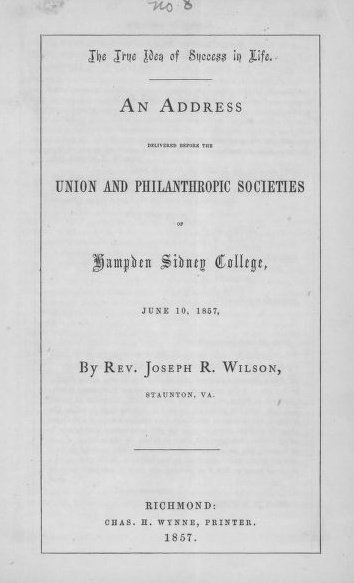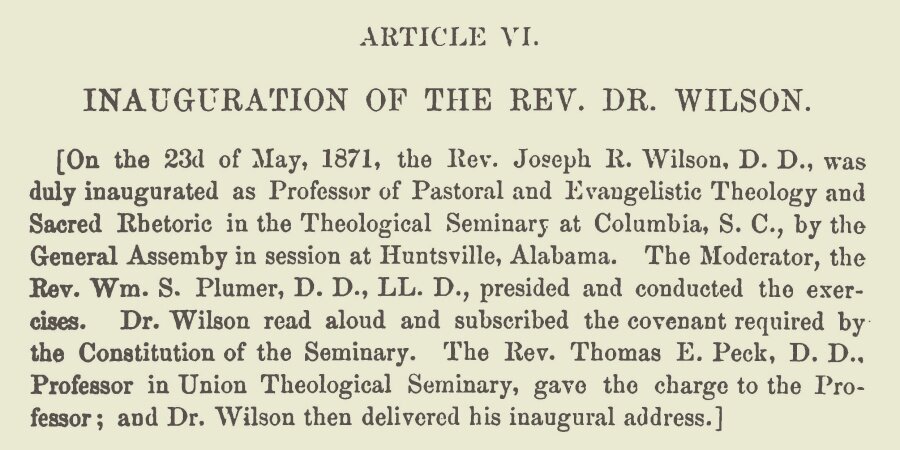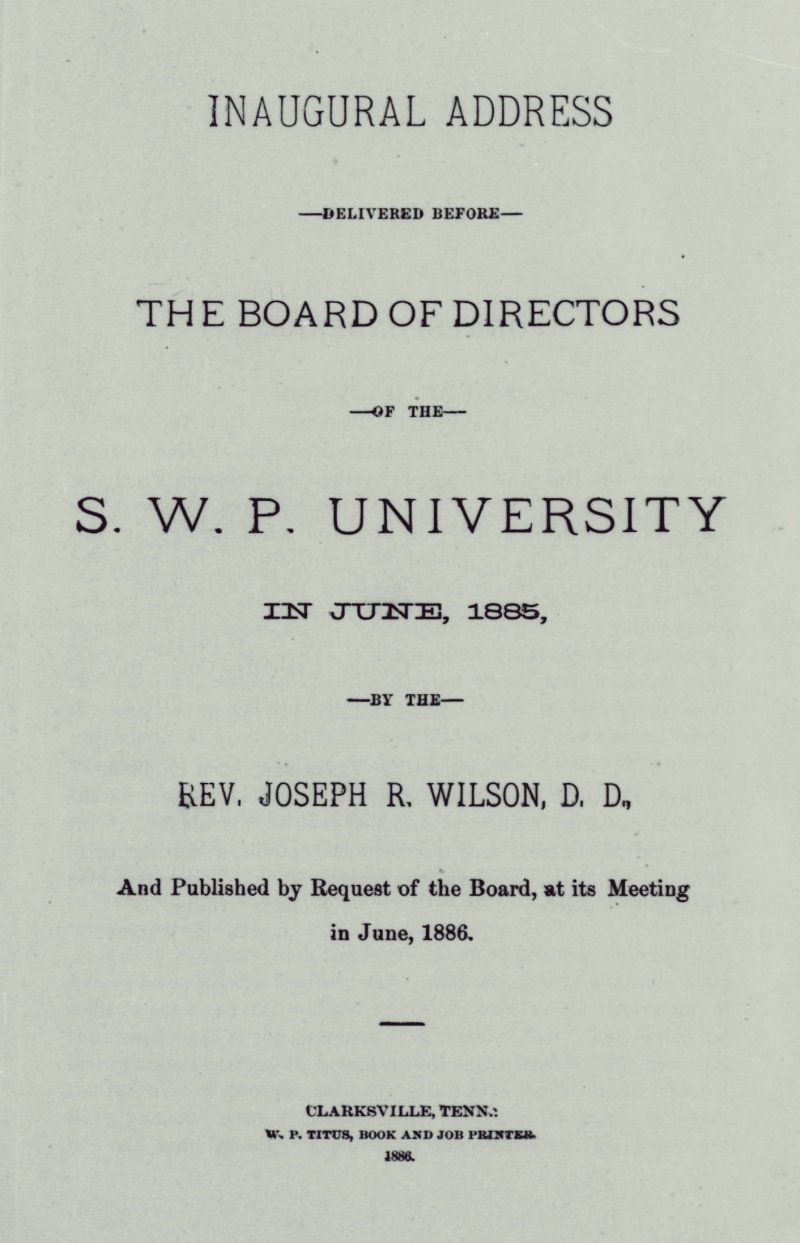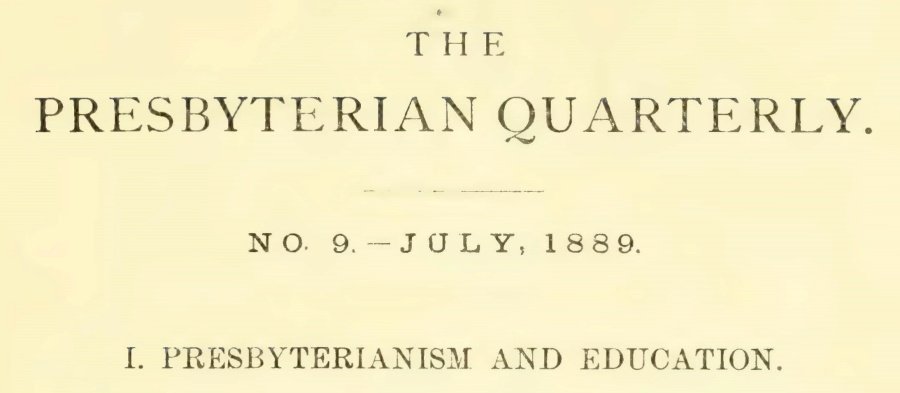The manse of the First Presbyterian Church of Augusta, Georgia was the home of the Rev. Dr. and Mrs. Joseph Ruggles Wilson from 1860 to 1870.
Joseph Ruggles Wilson, Sr. is buried at First Presbyterian Churchyard, Columbia, South Carolina.
Mutual Relation of Masters and Slaves as Taught in the Bible (1861)
The General Assembly of 1862 (1862)
Beneficiary Ministerial Education (1864)
The Life of Joseph Addison Alexander (1870)
In What Sense are Preachers to Preach Themselves (1874)
Parable of the Two Sons (1879)
General Assembly [PCUS] Moderator’s Sermon (1880)
Evangelists and Evangelistic Work (1880)
“They Changed Their Minds” (1882)
“They Forsook All, and Followed Him” (1882)
“And They All Forsook Him, and Fled” (1883)
“Be Thou Faithful Unto Death” (1883)
“So Soon as I Shall See How It Will Go With Me” (1883)
“For All Things Are Yours” (1884)
Inaugural Address Before the Board of Directors of the S.W.P. University, in June, 1885 (1886)
Memorial Address (Southern Presbyterian Quarter-Centennial) (1886)
Presbyterianism and Education (1889)
He Shall Come to be Glorified in His Saints (1889)
Sermon: “Yesterday, To-Day and Forever” (1893)
Fragment manuscript sermon of Joseph Ruggles Wilson, originally delivered at First Presbyterian Church (Wilmington, N.C.), April 30, 1876. In this sermon fragment Wilson considers the activity of faith and its significance. Sermon on James 2:20. Courtesy of the C. Benton Kline, Jr. Special Collections and Archives, Columbia Theological Seminary.
Manuscript sermon of Joseph Ruggles Wilson, originally delivered at First Presbyterian Church (Wilmington, N.C.), 1878. Wilson preached this sermon again in 1879 at the 19th General Assembly the Presbyterian Church in the United States in Louisville (Ky.) when serving as moderator, and also at Grace Street Presbyterian Church (Richmond, Va.), January 3, 1897. Wilson describes some of the extraordinary things achieved by Biblical characters who all ascribe their work to faith and then claims that faith works with equal power today. He lists three things which bring evil to mankind, the world, the flesh, and the devil, and, for each, describes how faith works as a barrier for the soul. Sermon on Genesis 47:8. Courtesy of the C. Benton Kline, Jr. Special Collections and Archives, Columbia Theological Seminary.
Manuscript sermon of Joseph Ruggles Wilson, originally delivered at First Presbyterian Church (Wilmington, N.C.), February 9, 1879. concerning God's fatherly nature. Wilson explains how there are three types of sons: those who trust in Christ and follow him, those who trust themselves and follow the Pharisees, and those who trust themselves and follow the devil. He goes on to show how God is both a father and a ruler and, as such, demands obedience. He explains how we must cultivate ourselves to be a habitable abode for the divine and shows the consequences for those who do not. Sermon on Matthew 21:28. Courtesy of the C. Benton Kline, Jr. Special Collections and Archives, Columbia Theological Seminary.
Manuscript sermon of Joseph Ruggles Wilson, originally delivered at First Presbyterian Church (Wilmington, N.C.), January 1, 1882. In this sermon Wilson takes the opportunity of the new year to discourse on the need for constant change. Wilson describes both the hard headed who never change and the irresolute who constantly change on a whim as being equally hard to move in the right direction. He then shows how even good Christians must constantly change in order to continue on the path towards Christ's ideal, declaring that God is the pole-star that must always be followed. Sermon on Acts 28:6. Courtesy of the C. Benton Kline, Jr. Special Collections and Archives, Columbia Theological Seminary.
Manuscript sermon of Joseph Ruggles Wilson, originally delivered at First Presbyterian Church (Wilmington, N.C.), 1882, and again, April 7, 1898, concerning what is to be forsaken in order to follow Christ. Wilson describes the "all" that Christ's apostles had to forsake to follow him: their livelihood, their families, their religion, etc. He then describes what people in current times must forsake: whatever it is that stands in the way of complete devotion to Christ. He concludes by stating that as long as one gives his or her heart, all else will be taken care of. Sermon on Luke 5:11. Courtesy of the C. Benton Kline, Jr. Special Collections and Archives, Columbia Theological Seminary.
Manuscript sermon of Joseph Ruggles Wilson, originally delivered at First Presbyterian Church (Wilmington, N.C.), 1883. Delivered also at Second Presbyterian Church (Richmond, Va.), January 10, 1897 and again at First Presbyterian Church (Wilmington, N.C.), April 24, 1898. Wilson describes how Christ's disciples fled and forsook him at the time of his arrest and explains how their actions were a product of a double hope. They hoped that Christ would re-establish Israel as a powerful empire and that they would have an advantageous place there. Once Christ submitted to arrest this hope fell apart and they fled, only later realizing the spiritual nature of Christ's kingdom. He finishes by describing a friend on death's door who exemplified this idea perfectly. Sermon on Mark 14:50. Courtesy of the C. Benton Kline, Jr. Special Collections and Archives, Columbia Theological Seminary.
Manuscript sermon of Joseph Ruggles Wilson, originally delivered at First Presbyterian Church (Wilmington, N.C.), December 1883, and again at the same church, February 27, 1898. In this sermon Wilson compares and contrasts men and angels, positing that despite differences both are expected to be God's faithful messengers. Sermon on Revelation 2:10. Courtesy of the C. Benton Kline, Jr. Special Collections and Archives, Columbia Theological Seminary.
Manuscript sermon of Joseph Ruggles Wilson, originally delivered at First Presbyterian Church (Wilmington, N.C.), December 30, 1883, and again at the same church, March 27, 1898. Also delivered at Second Presbyterian Church (Richmond, Va.), January 9, 1898. Wilson describes how the Apostles, even with their divine gifts, were unable to foresee the future and shows how there is nothing but uncertainty in this world. He goes on to tell how the Apostles were able to overcome the anxiety this causes by learning to trust in Christ and their eternal future. Sermon on Philippians 2:23. Courtesy of the C. Benton Kline, Jr. Special Collections and Archives, Columbia Theological Seminary.
Fragment manuscript sermon of Joseph Ruggles Wilson, originally delivered at First Presbyterian Church (Wilmington, N.C.), June 8, 1884, and again at First Presbyterian Church (Richmond, Va.), undated. In this sermon fragment Wilson discusses how "all things are yours" if your faith is given to Christ. He briefly describes how no mortal can give the true riches and true glory that faith in Christ can. Sermon on 1st Corinthians 3:21. Courtesy of the C. Benton Kline, Jr. Special Collections and Archives, Columbia Theological Seminary.
Manuscript sermon of Joseph Ruggles Wilson, originally delivered at First Presbyterian Church (Wilmington, N.C.), Dec. 27, 1894, in which he ruminates over the certainty of death. Wilson begins by contemplating the fact that even the long lived antediluvians died, noting that little was written of their lives but that we can be certain they were wicked because God destroyed them in the great flood. He then references Enoch as one who never died because he "walked with God" and reminds his listeners that, similarly, those who are good never truly die. Their bodies may perish but they live on in heaven. Sermon on Genesis 5:27. Courtesy of the C. Benton Kline, Jr. Special Collections and Archives, Columbia Theological Seminary.
Manuscript sermon of Joseph Ruggles Wilson, originally delivered at First Presbyterian Church (Wilmington, N.C.), January 1898. Delivered again at Second Presbyterian Church (Richmond, Va.), undated. In this sermon Wilson describes how the practice of religion is based on a covenant of mutual love between God and man and that the Bible describes the history of this relationship. He shows how love for God is based in the Gospel, how God uses stern rule merely as a means to wake up the sinner and lead him to the loving persona of Christ. Sermon on 1 John 4:19. Courtesy of the C. Benton Kline, Jr. Special Collections and Archives, Columbia Theological Seminary.



































